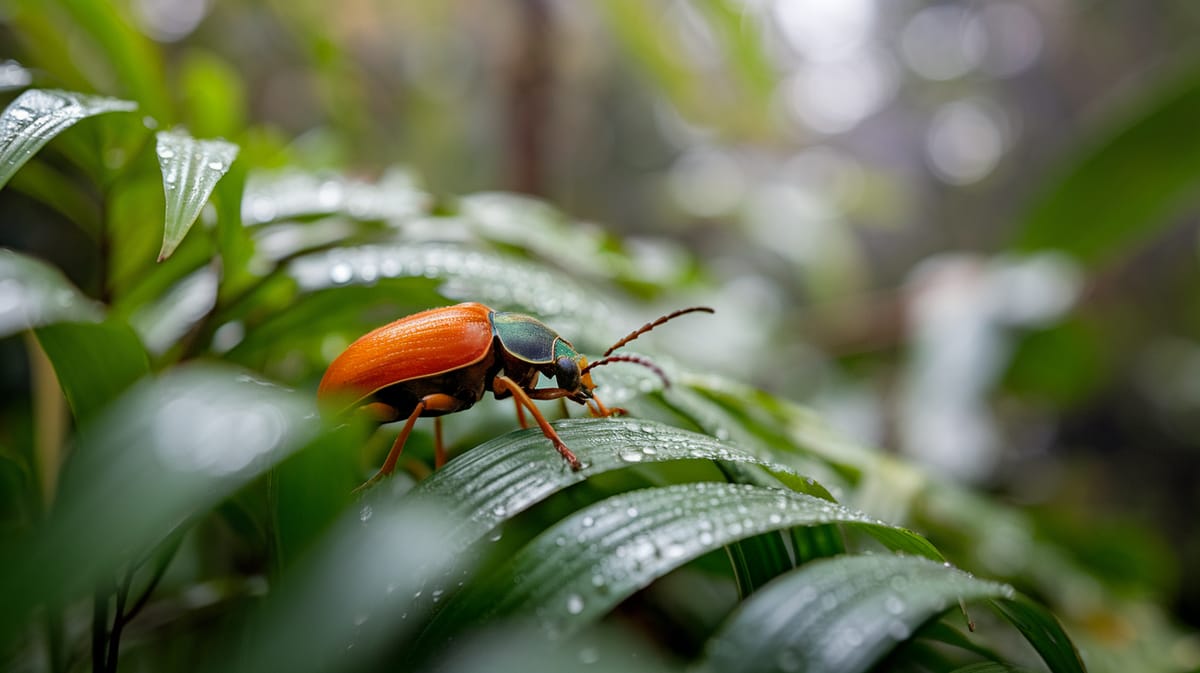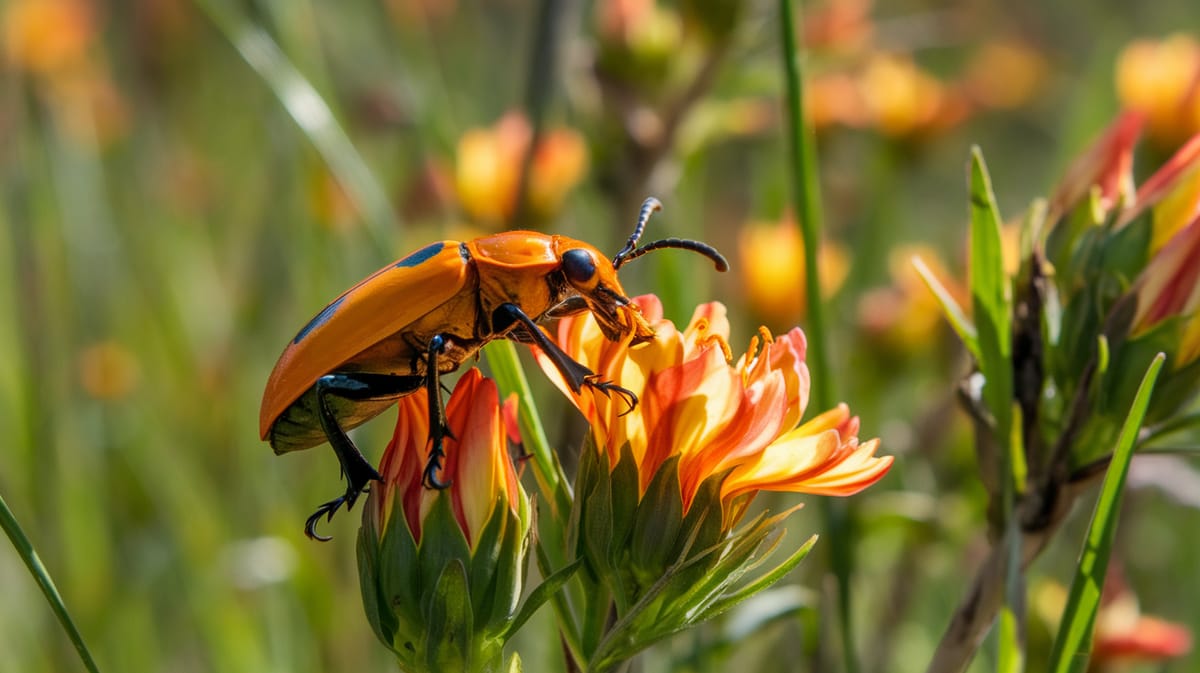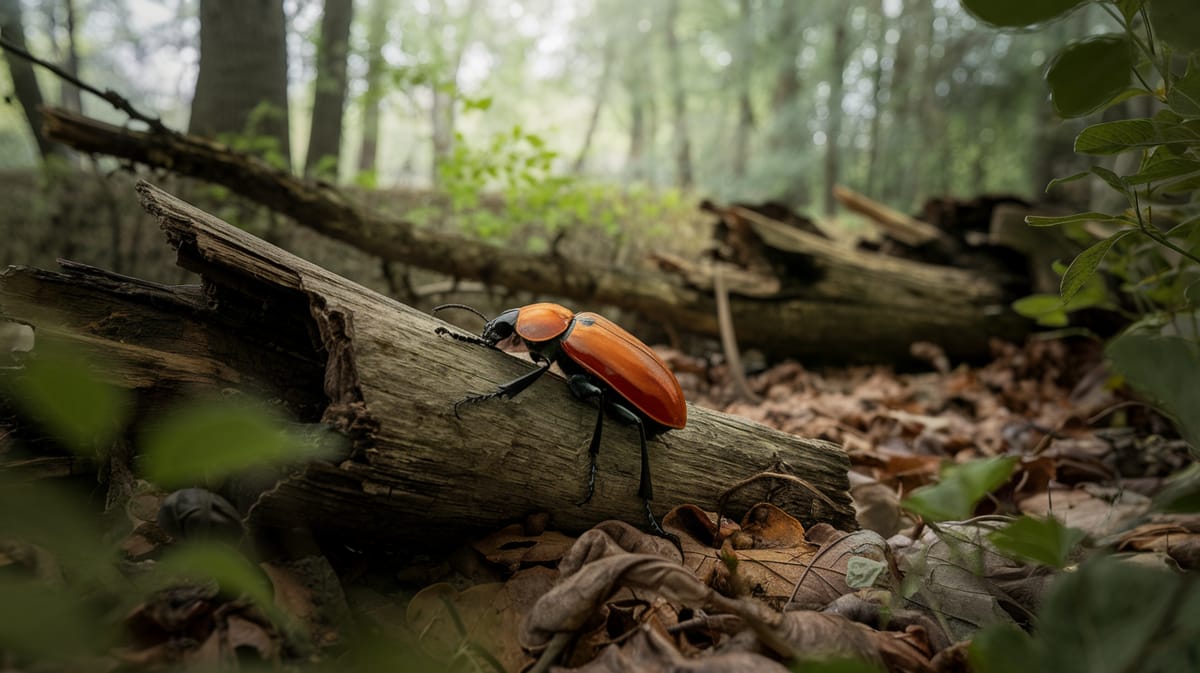Fire Colored Beetle
Brilliantly bright and adaptive, the Fire Colored Beetle is a vital decomposer, thriving in forest ecosystems. Its vibrant hues warn predators, showcasing nature's artful defense.

Key Insights at a Glance
Did You Know?
Taxonomy & Classification
Fire Colored Beetles display vivid hues and specialized adaptations, thriving as decomposers within diverse ecosystems. Let's understand the evolutionary journey and classification of these remarkable decomposers.
Global Presence
Pyrochroa beetles inhabit temperate regions across Europe and North America, highlighting their adaptability to various environmental conditions.
Evolutionary Adaptations
These beetles have evolved since the Cenozoic era, developing specialized enzymes to efficiently break down decaying wood.
Lifecycle and Growth
A remarkable journey of transformation from Egg to Adult.
Egg
Laid in clusters, the eggs are meticulously placed in decaying wood, providing a nutrient-rich environment for the emerging larvae.
Larva
Larvae feed voraciously on wood, developing strong jaws to break down fibers, vital for their growth.
Pupa
In this stage, the insect undergoes a remarkable transformation, reconfiguring its body structure to emerge as an adult.
Adult
Adults display vibrant coloration, crucial for communication and mating, while continuing to inhabit wooded areas.
Dietary Habits
A versatile forager with adaptive feeding habits, this insect mainly consumes insects, occasionally supplementing its diet with pollen and other organic matter.
| DIET TYPE | DESCRIPTION |
|---|---|
| Primary Diet | Primarily feeds on aphids, caterpillars, and beetle larvae, using its strong mandibles to capture and consume prey. |
| Secondary Diet | Supplements its diet with pollen, nectar, and decaying plant matter, providing essential nutrients and energy. |
| Occasional | Occasionally scavenges on carrion and feeds on fungi, taking advantage of available resources in its environment. |

Behaviour and Adaptations
Discover the fascinating traits of the Fire Colored Beetle and its unique survival strategies.
Heat Tolerance
Thrives in high temperatures due to its resilient exoskeleton.
Predator Evasion
Uses bright colors to warn predators of its potential toxicity.
Efficient Metabolism
Converts food into energy rapidly, aiding in quick escape and survival.
Ecosystem Impact
Vital role in sustaining ecosystems with Fire Colored Beetle contributions.
Decomposer Extraordinaire
Breaks down dead wood, aiding nutrient cycling and soil health.
Biodiversity Booster
Supports diverse forest life by providing habitat and food.
Predator Ally
Feeds on pest larvae, controlling unwanted insect populations.
Conservation Challenges
Understanding and addressing the major threats to Fire Colored Beetle populations.
Habitat Loss
Deforestation and land conversion reduce available habitats for Fire Colored Beetles.
Chemical Exposure
Pesticides and industrial chemicals pose significant risks to beetle health and survival.
Climate Change
Altered temperatures and weather patterns affect beetle life cycles and food sources.
Frequently Asked Questions
How long do Fire Colored Beetle live?
Fire Colored Beetles typically live for about one to two years, depending on environmental conditions and availability of food. Their lifecycle includes stages as eggs, larvae, pupae, and adults, with most of their life spent in the larval stage.
What do Fire Colored Beetle eat?
Fire Colored Beetles primarily feed on aphids, mites, and other small insects. They are considered beneficial predators in gardens and forests as they help control pest populations. Larvae often feed on decaying wood and organic matter.
Are Fire Colored Beetle poisonous?
Fire Colored Beetles are not poisonous to humans. They do not produce toxins that pose a threat to human health. However, like many beetles, they may release a mild odor when threatened.
Are Fire Colored Beetle endangered?
Fire Colored Beetles are not currently classified as endangered. They have a widespread distribution and are generally found in healthy numbers across their natural habitats. Conservation efforts focus on preserving these environments.
What do Fire Colored Beetle symbolize?
Fire Colored Beetles often symbolize transformation and renewal due to their life cycle and vibrant colors. In some cultures, they are seen as symbols of protection and good luck, especially in matters of agriculture and pest control.
Do Fire Colored Beetle bite?
Fire Colored Beetles are not known to bite humans. They are generally harmless and pose no significant threat. Their primary defense mechanism is to release a mild odor when disturbed, rather than biting.
What color are Fire Colored Beetle?
Fire Colored Beetles are typically bright red, orange, or yellow, often with black markings. Their vivid coloration serves as a warning to predators about their unpalatability. These colors can vary slightly depending on the species.
Does a Fire Colored Beetle have wings?
Yes, Fire Colored Beetles have wings. They possess two pairs: the hardened outer wings called elytra, which protect the softer, membranous flight wings underneath. These beetles are capable of flight, using their wings to escape predators and find food.
What does a Fire Colored Beetle look like?
Fire Colored Beetles are small to medium-sized, with elongated bodies and vibrant red, orange, or yellow coloration, often marked with black. They have prominent antennae and strong legs, adapted for crawling and clinging to surfaces.
Is a Fire Colored Beetle an insect?
Yes, a Fire Colored Beetle is an insect. It belongs to the order Coleoptera, which comprises beetles. Like all insects, it has a three-part body structure: head, thorax, and abdomen, and is characterized by its six legs and two pairs of wings.
Related Insects
Discover insects with similar characteristics to Fire Colored Beetle - including shared habitats, diets, and taxonomic classifications
Share this profile
Help others discover Fire Colored Beetle
